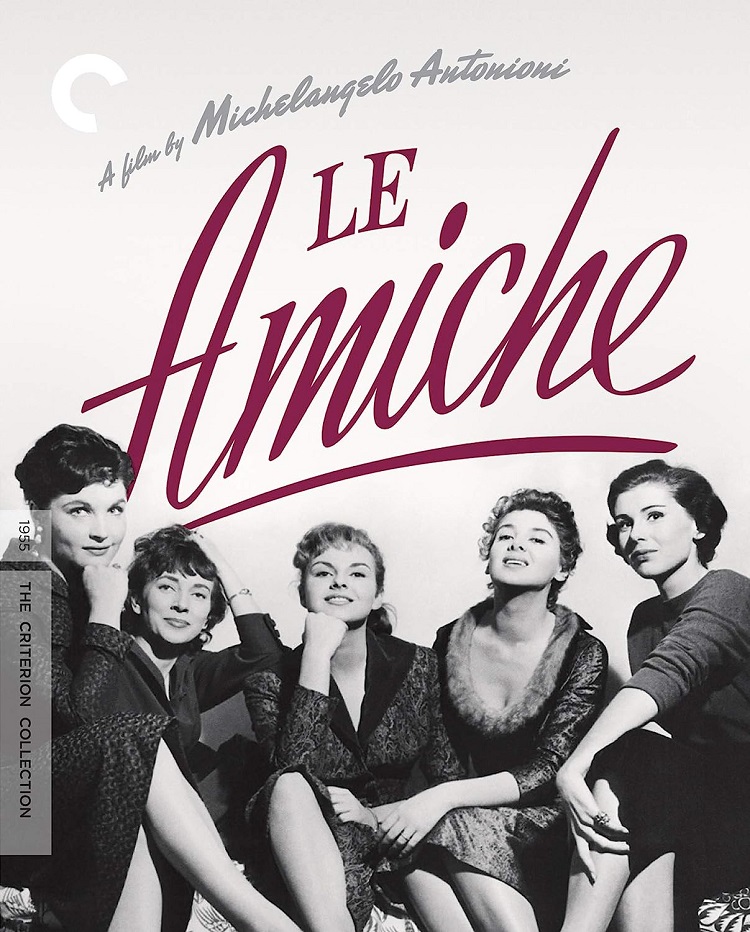
It’s tempting to label Michelangelo Antonioni’s fourth feature film Le Amiche a transitional work, as it shuns Neorealism and embraces melodrama like some of his earlier work, but also moves toward the aggressively modernist sensibilities that would define subsequent masterpieces like L’Avventura, La Notte and Red Desert.
While it’s true that Le Amiche only obliquely studies interpersonal alienation, it’s also more than just a bellwether for the more experimental work to come. With its long, meandering takes and restrained performances, it acts like a melodrama that’s had the passion slowly drained out of it, and stands on its own as a fascinating, if not electrifying portrait of an Italy where immediate post-war concerns had largely faded.
The subject matter, which is based on a Cesare Pavese novella and revolves around unrequited romance, suicide attempts, high fashion, and a backbiting clique of bourgeois women, is plenty lurid on its face, but Antonioni’s approach works to emphasize the emptiness that underpins all of the interactions.
That aloofness is established early, filtering the film’s events through the eyes of an outsider, Clelia (Eleonora Rossi Drago), a woman who has returned to her native Turin from Rome to open up a dress salon. Clelia gets swept up into the drama of a circle of friends when one of them (Madeleine Fischer’s Rosetta) tries to overdose on sleeping pills in the hotel room next to her’s.
Though Rosetta’s hysterics, largely motivated by her thwarted feelings for painter Lorenzo (Gabriele Ferzetti), are possibly not entirely genuine, she emerges as easily the most sympathetic person Clelia encounters. She especially compares well to Momina (Yvonne Furneaux), who takes the initiative to integrate Clelia into the friend group, but who views said friends as playthings more than people.
In the midst of navigating all that, Clelia works to establish her business and moves toward a tentative romance with Carlo (Ettore Manni), a construction worker assigned to her salon. Like most of the other emotions portrayed in the film, their attraction is incredibly muted, and mostly serves to underline the isolation Clelia feels, out-of-place in her hometown. Unsurprisingly, that feeling extends to the film’s conclusion, as Antonioni sets up all the pieces for emotional catharsis, and then stubbornly refuses to let them fall into place.
Criterion presents Le Amiche in a 1080p, 1.33:1 transfer that’s sourced from a 2K restoration by L’Immagine Ritrovata from the 35mm original camera negative. The image represents a slight, but welcome upgrade over the 2011 Masters of Cinema Region B Blu-ray release. Both offer clean, if slightly soft images, but Criterion’s displays a healthier amount of fine detail and slightly better grayscale reproduction, with deeper blacks.
Extras are all-new and exclusive to this release. Scholars Karen Pinkus and David Forgacs discuss the film as an adaptation and in relation to Antonioni’s other work, while scholar Eugenia Paulicelli offers an in-depth look at the film’s fashion and its place in the Italian fashion landscape. (Gucci helped fund the restoration, if that provides any clue.) An insert with an essay by Tony Pipolo is also included.